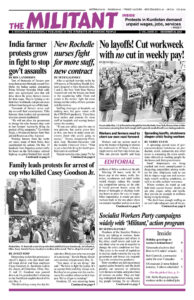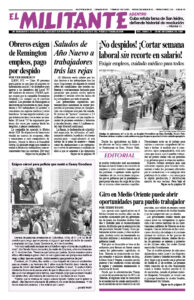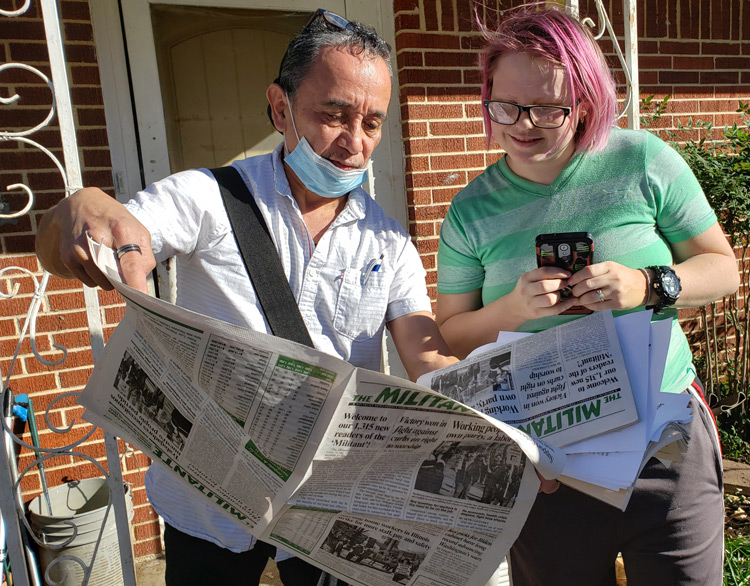Members of the Socialist Workers Party are talking to workers, farmers, small shopkeepers and others in big cities, small towns and rural areas about what we can do together to change the crisis conditions we face. This crisis is the result of capitalism in decline, made worse by the way the government and bosses are responding to the coronavirus pandemic.
Party members are joining protests against police brutality and the death penalty, car caravans in solidarity with farmers in India, and picket lines of workers on strike. They are finding widespread interest among working people looking for an effective way to fight back in the party’s action program, the Militant and books by Socialist Workers Party leaders and other revolutionaries.
Samuel and Jamie Cates were glad that SWP members Hilda Cuzco, Gerardo Sánchez and George Chalmers knocked on their door in Kaufman, Texas, a small town east of Dallas, Dec. 10. Samuel has a tree-trimming business, but work has been slow, and Jamie is a laid-off warehouse worker.
When Sánchez showed them the Militant and explained that it tells the truth about what working people face, Samuel said, “It’s really hard to find a paper like this.”
The SWP campaigners made sure they got a copy of the party’s action program, reprinted in the Militant, which poses the fight for jobs as the central question. It says workers and our unions need to fight for a shorter workweek with no cut in pay to stop layoffs, and for a government-funded public works program to create millions of jobs at union scale, building hospitals, schools, day care and replace crumbling infrastructure. “Working people need to understand our own worth and our capacities in order to win,” Chalmers said.
The Cates said they’ve been paying attention to demonstrations against police brutality and killings over the last year. They’ve had their own run-ins with the cops, who threw Jamie in jail. Then the police dropped the charges without explanation.
“One thing that surprises me,” Jamie said, “is that some people say everything is about race. Just because you are white you are accused of being a racist.”
“Blacks are disproportionately the victims of police brutality,” Sánchez said, “but police brutality is a class question. The cops brutalize workers to keep us in our place so we won’t have confidence to change things. A government controlled by the rich doesn’t have any solutions to what working people face.
“That’s what is different about Cuba, where workers and farmers made a revolution and took political power into their own hands. We need to learn about and emulate that example here in the U.S.,” Sánchez said.
Jamie Cates said she hadn’t heard much about the Cuban Revolution, but was interested in learning more. They subscribed to the Militant.
Oppose the death penalty!
At a protest against the execution of Brandon Bernard outside the federal prison in Terre Haute, Indiana, Dec. 10 (see page 5), SWP member Samir Hazboun met Indiana University student Brian Hancock. The party’s action program calls the death penalty “an anti-working-class weapon in the hands of the rulers.”
“If a revolution were to succeed in the United States what would you propose doing with the capitalists?” Hancock asked.
Hazboun showed him the book Socialism on Trial, saying it takes up this question. He explained how on the eve of the Second World War, SWP and revolutionary-minded Teamster union leaders in Minneapolis were framed up by the Franklin D. Roosevelt administration and “sent to a federal prison like the one behind us.”
“The heart of the book is the testimony by party leader James P. Cannon, who explains that the capitalist rulers will try to hang onto power by brutal, violent and bloody means,” Hazboun said. “The working class will do everything it can to minimize that threat, as we fight to establish and defend our own government.”
“I’ve never heard that perspective before, that the ruling class are the ones who bring bloodshed when it comes to revolution,” Hancock said. He got a subscription to the Militant and a copy of Is Socialist Revolution in the US Possible? by SWP leader Mary-Alice Waters.
Gabby Prosser, a 24-year-old barista, and Nick Neeser, a 22-year-old carpenter, drove from Minneapolis to join Hazboun and other SWP members at the protest. They went back with them to Louisville, Kentucky, where they brought solidarity to the picket line of striking Teamsters at DSI Tunneling and talked to workers on their doorsteps.
Neeser described the exchange he and SWP campaigner Jacquie Henderson had with a UPS worker they met. “I was struck by how he listened carefully to us explain our recent experience at the death penalty protest and more broadly the party’s program,” he said. “Then he just said, ‘The death penalty is no good for working people and the rich are rich because they’re rich.’ He gave us a $10 contribution. It gave me a boost in confidence to see how he responded to our program.”
Solidarity with farmers in India
In New York, SWP member Róger Calero said, “We got a great response from young Sikhs who organized a car caravan through the city Dec. 13 to bring attention to the fight by millions of farmers in India demanding a repeal of laws there that threaten their livelihoods.
“When they made a stop at Times Square, some participants hopped out of their cars to take pictures with SWP members who were waiting for the caravan with party signs that said, ‘Workers and farmers in India and the U.S. fight together.’”
Some of the participants were surprised when we explained that working farmers in the U.S. also are losing their land. A number took copies of the party’s action program and got copies of the Militant.
Interested in joining efforts to advance the working-class movement? Contact the SWP or Communist League branch nearest you to find out how you can get involved. See the directory.


